
Guests
- Linda Sarsourdirector of the Arab American Association of New York and the national advocacy director for the National Network for Arab American Communities.
- Matt Apuzzoreporter for The New York Times and co-author of Enemies Within: Inside the NYPD’s Secret Spying Unit and Bin Laden’s Final Plot Against America. He and his colleagues at the Associated Press were awarded the Pulitzer Prize for Investigative Reporting for a series of articles revealing the extensive domestic surveillance program deployed by the New York City Police Department in the wake of 9/11.
The New York City Police Department is disbanding a controversial spying unit that targeted Muslim communities. The so-called “Demographics Unit” secretly infiltrated Muslim student groups, sent informants into mosques, eavesdropped on conversations in restaurants, barber shops and gyms, and built a vast database of information. But after years of collecting information, it failed to yield a single terrorism investigation or even a single lead. We get reaction from Linda Sarsour of the Arab American Association of New York, who calls the unit’s closure a “welcome first step,” but says it will “take years to undo the trauma that the American Muslim community has endured.” We are also joined by Matt Apuzzo, who was part of the Associated Press team that first revealed the NYPD’s post-9/11 surveillance program. The AP’s series won the Pulitzer Prize for Investigative Reporting. Apuzzo is co-author of “Enemies Within: Inside the NYPD’s Secret Spying Unit and Bin Laden’s Final Plot Against America.”
Transcript
AMY GOODMAN: The New York Police Department says it’s abandoned a secretive program that spied on Muslims. The so-called Demographics Unit dispatched plainclothes detectives into Muslim neighborhoods to eavesdrop on their conversations, and built detailed files on where people ate, prayed and shopped. But after years of collecting information, the police acknowledged it failed to yield a single terrorism investigation or even a single lead.
All of this came after a series of articles by the Associated Press that revealed the extensive domestic surveillance program deployed by the New York Police Department in the wake of 9/11. The series won the Pulitzer Prize for Investigative Reporting. We’re joined by one of the reporters on that team, Matt Apuzzo, who is now here with us in New York. He’s with The New York Times now. He is co-author of Enemies Within: Inside the NYPD’s Secret Syping Unit and Bin Laden’s Final Plot Against America.
Also joining us, Linda Sarsour, executive director of the Arab American Association of New York and national advocacy director for the National Network for Arab American Communities.
We welcome you both to Democracy Now! Matt, explain the Demographics Unit.
MATT APUZZO: Sure. So the Demographics Unit was created in 2003, and the idea was the NYPD would send about a dozen plainclothes detectives of South Asian or Arab descent out into Muslim neighborhoods every day to just kind of be—sort of blend into the community and keep their eyes and ears open. So, they would go out to a coffee shop, and one of their first jobs was to gauge sentiment. So you go in, you talk to the guy behind the counter, and you see if you can chat him up a little bit about what he thinks about America, what he thinks about foreign policy, what he thinks about drones. And then you go, and you have your coffee, and you listen. You just listen to the conversations. And some of those conversations end up in police files, conversations like two Pakistani men speaking in Urdu about the State of the Union address and what they thought of the State of the Union.
And all of this stuff goes in files, and it gets organized by ethnicity and ancestry, so you have files on Egyptians, Pakistanis, Palestinians, where people—you can watch cricket, where you can—where people gather to watch soccer. And the idea is, if the NYPD were to ever get, let’s say, a specific tip about an Egyptian terrorist, you know, inside New York City, well, they could pull the Egyptian folder off the shelf, and they’d know everywhere in the city that an Egyptian might rent a room, where he’d buy his coffee, where he’d buy his groceries, where he’d get his hair cut, and that’s where they’d look. And the idea was also to look for hotspots, you know, a place where there was sort of anti-American sentiment, where people were sort of angry over drones or angry over foreign policy, that sort of a anti-American or sort of jihadist sentiment might sort of, you know, bubble up.
AMY GOODMAN: And so, that’s the Demographics Unit.
MATT APUZZO: That’s the Demographics Unit.
AMY GOODMAN: What about those that sent people into mosques? What did they call them? Mosque crawlers?
MATT APUZZO: They’re mosque crawlers. So those were informants. Those were run by a separate unit, the Terrorist Interdiction Unit. Those were units—that’s the unit that designated mosques, entire mosques, as terrorism enterprises and allowed—and if the entire mosque is the terrorism enterprise, then everybody who attends the mosque can be subjected to surveillance. So the—they’ll use license plate readers to collect information on who’s attending mosques and use informants with hidden microphones to audiotape sermons. And these investigations stretch on for years and years. And, of course, no mosque has been charged. I mean, the NYPD developed no information that a mosque was a terrorist organization.
AMY GOODMAN: And that was started with the help of the CIA?
MATT APUZZO: The Demographics Unit was actually started with the help of the CIA. It was actually the brainchild of a CIA officer who’s on the payroll of the CIA. And—you know, but they certainly had a hand in starting the Terrorist Interdiction Unit, as well.
AMY GOODMAN: Didn’t the New York Police Department take David Cohen from the CIA to be top guy in the New York Police Department?
MATT APUZZO: Right. So, Dave was the top—the head of the Intelligence Division at the NYPD, the top intelligence guy at NYPD, career CIA officer. But, you know—and that’s fine. He was retired. But the interesting part of the relationship is that somebody named Larry Sanchez, who was actually still on the CIA payroll, was working out of NYPD and helped build these programs. An internal CIA investigation, after we wrote our stories for the AP, found no—they didn’t—the CIA didn’t break any laws, but found, you know, there was no legal agreement, there were no rules, there wasn’t—there were no clear guidelines, they left him there too long, he had no supervision. So, I mean, it really just shows, again, we’re talking about a post-9/11 kind of—we rush in, and now I think we’re only now kind of really understanding the breadth of some of these things.
AMY GOODMAN: So they’re saying that the Demographics Unit has been closed. The unit that sent people into the mosques, has that been closed?
MATT APUZZO: No.
AMY GOODMAN: And again, it’s called?
MATT APUZZO: The Terrorism Interdiction Unit. And I think—you know, they may rename. I don’t know what they’re going to do. But I don’t think anybody would say you don’t need informants, so I can’t imagine them closing an effort to develop informants. I mean, informants are crucial to law enforcement and crucial to the counterterrorism effort. It’s how you run them that makes this unit unique. So, I would be—I would be really surprised if they just said, “We’re not going to use informants anymore.” But I think we’re all waiting to see what the new guidelines the new police commissioner comes up with on what the rules are going to be.
AMY GOODMAN: In a statement, New York Mayor Bill de Blasio said, “Our administration has promised the people of New York a police force that keeps our city safe, but that is also respectful and fair. This reform is a critical step forward in easing tensions between the police and the communities they serve so that our cops and our citizens can help one another go after the real bad guys.” That’s the words of Mayor de Blasio. Linda Sarsour, how did the Demographics Unit affect your community and you?
LINDA SARSOUR: The Demographic Unit, as Matt explained, are—you know, created psychological warfare in our community. You didn’t know who you were sitting with at the café. You didn’t know, if someone was asking, you know, “What do you think about what’s happening in Palestine/Israel?” if you wanted to even get into a political discussion. You know, many people who are in our community are fleeing political persecution, and they come from countries where you’re not allowed to speak up against the government. You could be arrested. People talking about, you know, religious leaders, recording their sermons, afraid that an informant will take them out of context—you know, being at the mosque and not knowing who the person next to you is and thinking they might be an informant, it just really creates psychological warfare in a community. And I think that the disbandment of the Zone Assessment Unit, for me, is definitely a welcomed first up, but it’s going to take years to undo the trauma that the American Muslim community has endured under Commissioner Kelly and his Intelligence Division with the help of the CIA.
AMY GOODMAN: How did this happen, the closing of the Demographics Unit? Often we hear about a decision, that it was—and you assume it was just inspired by the leader that announces that decision, the mayor or the governor. What kind of grassroots activism went into this?
LINDA SARSOUR: This has been years of activism from members of the American Muslim community and our allies. It includes courageous plaintiffs who have taken risks to sue the New York Police Department in a lawsuit, Raza v. The City of New York. We have a lawsuit out of New Jersey, as well. This is—included public pressure, rallies, joining coalitions with the folks working on stop-and-frisk to show that the New York Police Department has been conducting discriminatory police practices against many communities of color, including political activists. So, I don’t think the NYPD just woke up one morning and was like, “We want to be really nice today and disband the unit.” I think it took years of advocacy work. It included the—you know, Matt Apuzzo and Adam Goldman stories to help us kind of pull back the veil on the secretive program that was being conducted without any public information and without us knowing where our taxpayer dollars were going. So, this is definitely a community-wide effort.
AMY GOODMAN: Yes, Matt Apuzzo?
MATT APUZZO: Well, I was just going to add—you know, you said they didn’t wake up in the morning and decide to be nice to Muslims. In this instance, I think—I think they did a review of this program. And by any—by any accounting, even people inside the unit, you know, the bosses have said it didn’t produce any—it didn’t produce anything. It didn’t generate any leads. It didn’t lead to any terrorism investigations. And as one CIA official, who, you know, was read in on this—and we talk about this in our book—she reads it, and she says to Dave, “Dave, you know where the Muslims are, but this doesn’t tell you where the terrorists are.” I mean, so I think this is—this is an easy one to say, “Well, this is expensive, and we’re spending money on food and expenses, and what are we getting in return?” So, I agree it wasn’t an effort to sort of be nice to anybody. I think they made a law enforcement decision that, “Hey, we could do this just by going in overtly and saying, 'Here we are. We'd like to have a relationship with you.’”
AMY GOODMAN: Speaking to MSNBC last year, New York City police commissioner at the time, Ray Kelly, responded to an earlier report by Matt Apuzzo, at the time working for AP, that the NYPD has labeled mosques as terrorist organizations. Commissioner Kelly insisted the NYPD’s operations were legal.
COMMISSIONER RAY KELLY: I haven’t seen the story, but they’re hyping a book that’s coming out next week. Actually, the book is based on a compilation of about 50 articles that two AP reporters did on the department. If it’s a reflection of the articles, then the book will be a fair amount of fiction. It will be half-truths. It will be lots of quotes from unnamed sources. And our sin is to have the temerity, the chutzpah, to go into the federal government’s territory of counterterrorism and trying to protect this city by supplementing what the federal government has done.
JOE SCARBOROUGH: You do agree that entire mosques should not be labeled terrorist organizations, right?
COMMISSIONER RAY KELLY: Absolutely, of course, of course.
JOE SCARBOROUGH: OK. Let’s—
COMMISSIONER RAY KELLY: And again, we do—we do according to the law. What we’re investigating and how we investigate is done pursuant to a federal judge’s direction.
JOE SCARBOROUGH: Right.
AMY GOODMAN: That was the former police commissioner of New York, Ray Kelly, talking about Matt Apuzzo, now with The New York Times, won the Pulitzer Prize for his exposé of what the New York police were doing in New York in the Police Department. Matt, your response to what he was saying? This is all about hyping a book, he said.
MATT APUZZO: Well, I mean, you know, the facts speak for themselves. I mean, we interviewed people on the record in the book. It was really footnoted. There’s not really a dispute anymore, I don’t think, about what the NYPD was doing. You know, like everything, like with we’re hearing with the NSA, when people know what’s going on, we can have a debate about whether we should be doing it. And this is all sort of, I think, part of an examination that’s going on about surveillance and national security tactics, and we’re, you know, a decade after 9/11. Now that people know what’s going on, we can have sort of an informed debate about what we want it to be.
AMY GOODMAN: What was your first tip that broke this story wide open?
MATT APUZZO: You know, there wasn’t one tip. I mean, it started with just a series of conversations that Adam and I had while looking at CIA, you know, shenanigans on other stories, and we just sort of fell into this.
AMY GOODMAN: And do you think the Demographics Unit, Linda, as we wrap up, ends the kind of infiltration and intrusion into your community?
LINDA SARSOUR: Absolutely not. The closing of the unit is just one small step. We want to still talk about the informants that are being sent in our community, the standards in which they are sent. We want it to be based on suspicion of criminal activity, not just because of our faith. We want to talk about the new guidelines that the commissioner is working on and how communities could be involved in that process. This is a multi-step process, and there’s going to be probably decades until our community overcomes this. And we just hope that whatever we’re doing in the meantime, that it’s not going to affect the future community beyond the Muslim community.
AMY GOODMAN: I want to thank you both for being with us. Linda Sarsour is director of the Arab American Association of New York, national advocacy director for the National Network for Arab American Communities. And Matt Apuzzo is part of the team of reporters at the Associated Press that won the Pulitzer Prize for their exposé of the New York Police Department’s infiltration into the Muslim community. He now works for The New York Times and is co-author of Enemies Within: Inside the NYPD’s Secret Spying Unit and Bin Laden’s Final Plot Against America.
This is Democracy Now! When we come back, we’re going to London. How many environmentalists have been killed over the last decade? The number will astound you. Stay with us.

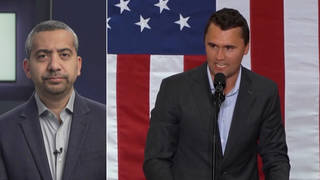
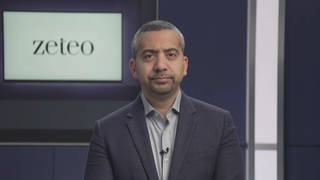
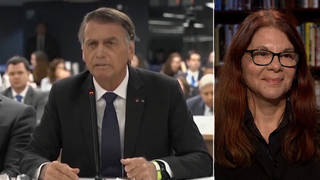
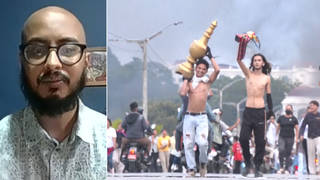





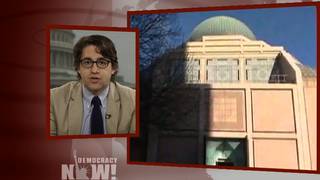
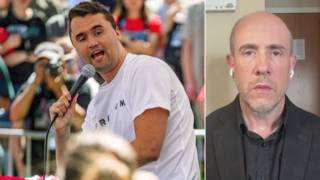
Media Options